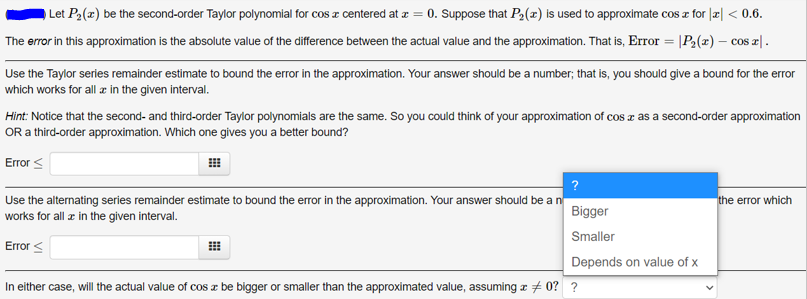Let P,(z) be the second-order Taylor polynomial for cos z centered at z = 0. Suppose that P3(z) is used to approximate cos z for |z| < 0.6. The error in this approximation is the absolute value of the difference between the actual value and the approximation. That is, Error = |P2(z) – cos z|. Use the Taylor series remainder estimate to bound the error in the approximation. Your answer should be a number; that is, you should give a bound for the error which works for all z in the given interval. Hint: Notice that the second- and third-order Taylor polynomials are the same. So you could think of your approximation of cos z as a second-order approximation OR a third-order approximation. Which one gives you a better bound?
Let P,(z) be the second-order Taylor polynomial for cos z centered at z = 0. Suppose that P3(z) is used to approximate cos z for |z| < 0.6. The error in this approximation is the absolute value of the difference between the actual value and the approximation. That is, Error = |P2(z) – cos z|. Use the Taylor series remainder estimate to bound the error in the approximation. Your answer should be a number; that is, you should give a bound for the error which works for all z in the given interval. Hint: Notice that the second- and third-order Taylor polynomials are the same. So you could think of your approximation of cos z as a second-order approximation OR a third-order approximation. Which one gives you a better bound?
Linear Algebra: A Modern Introduction
4th Edition
ISBN:9781285463247
Author:David Poole
Publisher:David Poole
Chapter6: Vector Spaces
Section6.3: Change Of Basis
Problem 17EQ
Related questions
Question
18.Need help

Transcribed Image Text:Let P2(x) be the second-order Taylor polynomial for cos a centered at æ = 0. Suppose that P2(x) is used to approximate cos z for |æ| < 0.6.
The error in this approximation is the absolute value of the difference between the actual value and the approximation. That is, Error = |P2(2) – cos a| .
Use the Taylor series remainder estimate to bound the error in the approximation. Your answer should be a number; that is, you should give a bound for the error
which works for all z in the given interval.
Hint: Notice that the second- and third-order Taylor polynomials are the same. So you could think of your approximation of cos a as a second-order approximation
OR a third-order approximation. Which one gives you a better bound?
Error <
?
Use the alternating series remainder estimate to bound the error in the approximation. Your answer should be a n
the error which
Bigger
works for all z in the given interval.
Smaller
Error <
Depends on value of x
In either case, will the actual value of cos z be bigger or smaller than the approximated value, assuming x + 0? ?
Expert Solution
This question has been solved!
Explore an expertly crafted, step-by-step solution for a thorough understanding of key concepts.
Step by step
Solved in 3 steps

Knowledge Booster
Learn more about
Need a deep-dive on the concept behind this application? Look no further. Learn more about this topic, algebra and related others by exploring similar questions and additional content below.Recommended textbooks for you

Linear Algebra: A Modern Introduction
Algebra
ISBN:
9781285463247
Author:
David Poole
Publisher:
Cengage Learning

Linear Algebra: A Modern Introduction
Algebra
ISBN:
9781285463247
Author:
David Poole
Publisher:
Cengage Learning